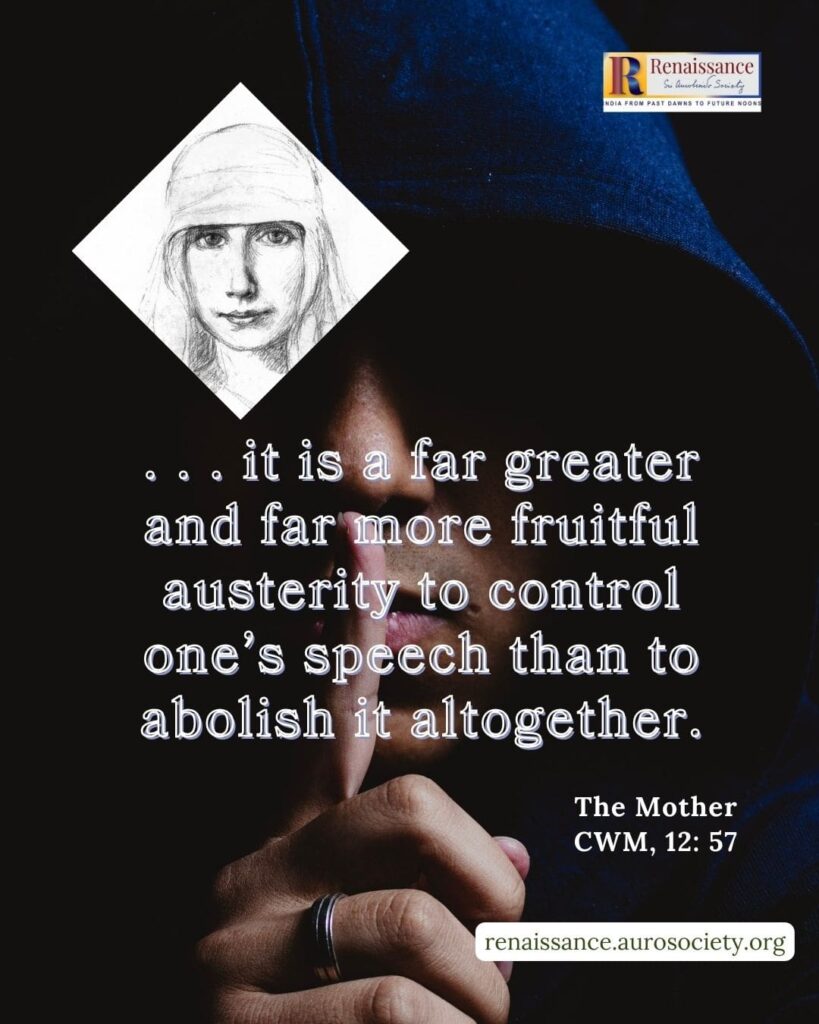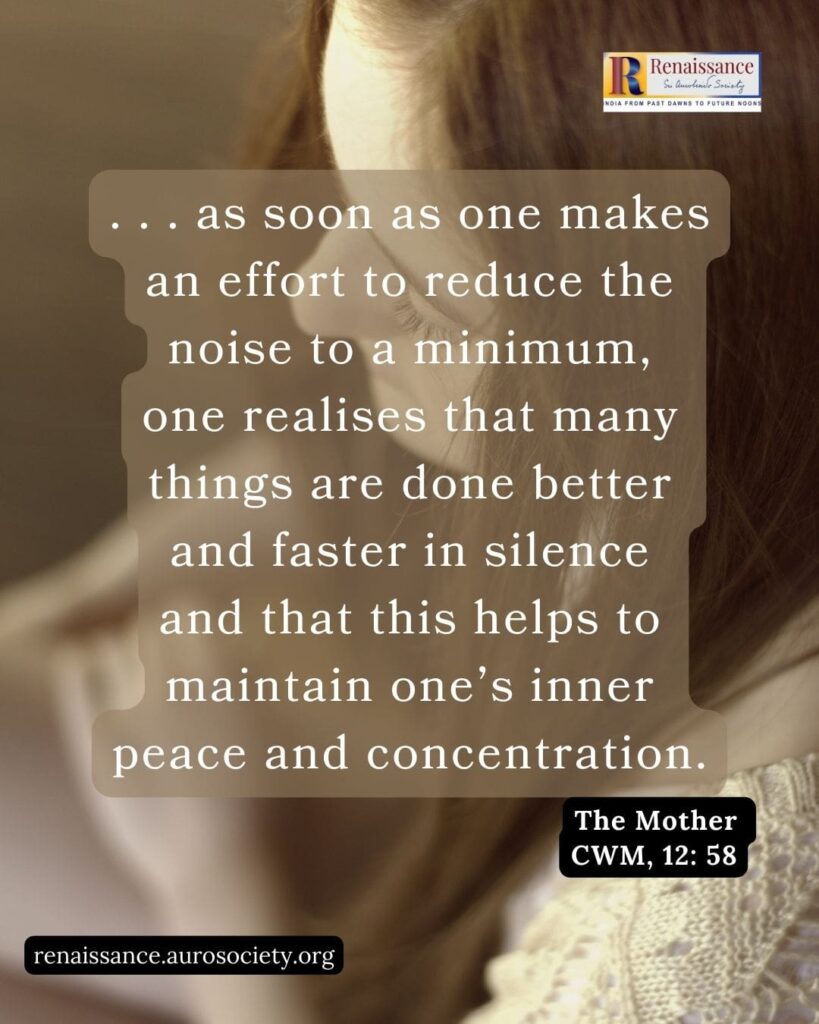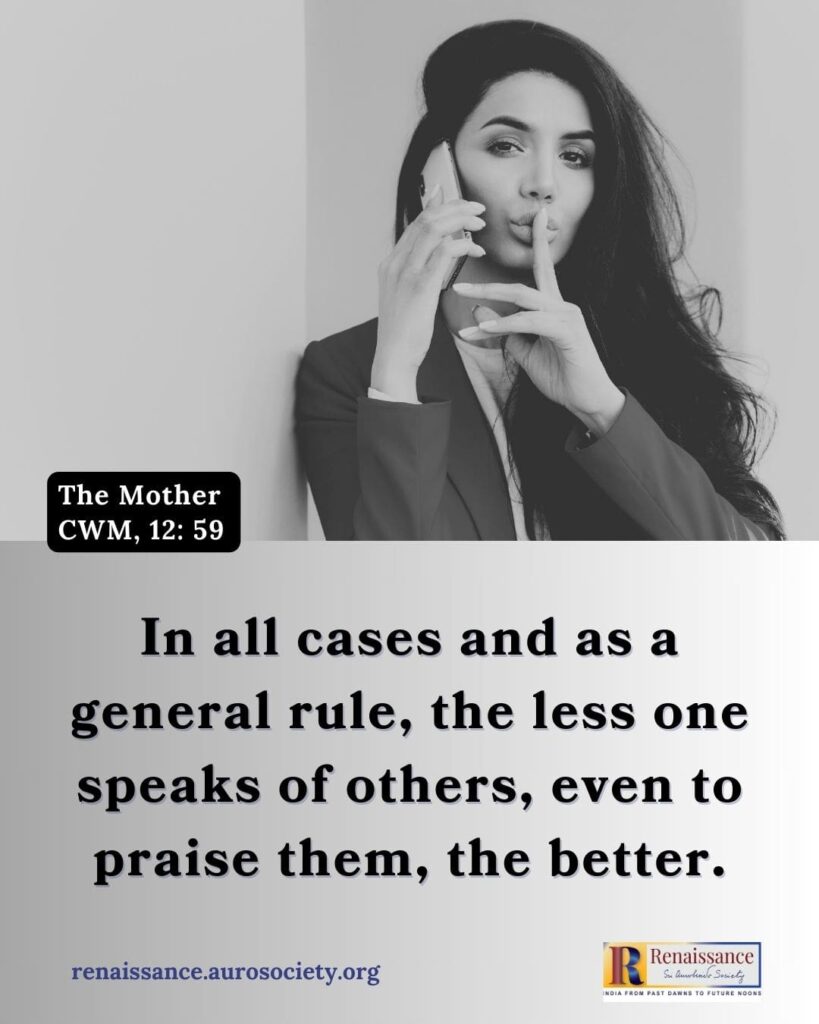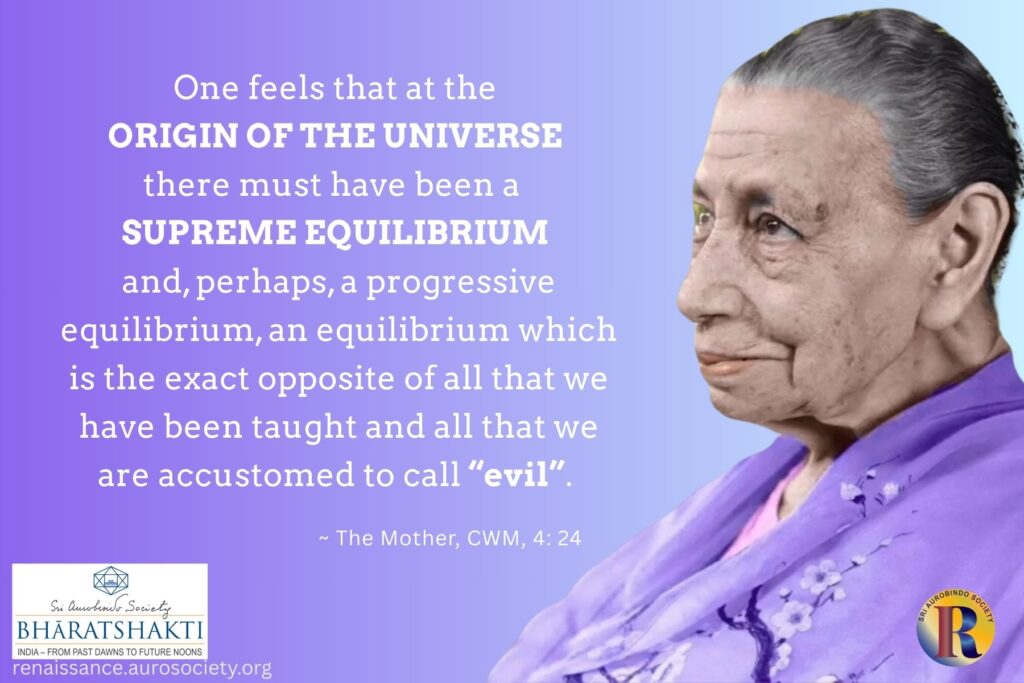Volume V, Issue 6-7
Author: The Mother
Editor’s Note: This selection from the Mother’s essay titled ‘The Four Austerities and the Four Liberations‘ reminds us of something very important when it comes to the practice of silence. The Mother emphasizes that to control one’s speech is “far more fruitful austerity” than the ascetic practice of complete abstinence from talking. Through several practical examples, she helps us understand how we can consciously practice this control of speech in order to progress on the path of Integral development.
The complete essay is included in Volume 12 of the Mother’s Complete Works (pp. 48-71) We have made a few minor formatting revisions and added some sub-headings for the ease of online reading.

PART 1
Control of Speech
The question of mental austerity immediately brings to mind long meditations leading to control of thought and culminating in inner silence. This aspect of yogic discipline is too well known to need dwelling upon. But there is another aspect of the subject which is usually given less attention, and that is control of speech. Apart from a very few exceptions, only absolute silence is set in opposition to loose talk. And yet it is a far greater and far more fruitful austerity to control one’s speech than to abolish it altogether.
Man is the first animal on earth to be able to use articulate sounds. Indeed, he is very proud of this capacity and exercises it without moderation or discernment. The world is deafened with the sound of his words and sometimes one almost misses the harmonious silence of the plant kingdom.

Mental Power and the Use of Speech
Besides, it is a well-known fact that the weaker the mental power, the greater is the need to use speech. Thus there are primitive and uneducated people who cannot think at all unless they speak, and they can be heard muttering sounds more or less loudly to themselves, because this is the only way they can follow a train of thought, which would not be formulated in them but for the spoken word.
There are also a great many people, even among those who are educated but whose mental power is weak, who do not know what they want to say until they say it. This makes their speech interminable and tedious. For as they speak, their thought becomes clearer and more precise, and so they have to repeat the same thing several times in order to say it more and more exactly.
Some need to prepare beforehand what they have to say, and splutter when they are obliged to improvise, because they have not had time to elaborate step by step the exact terms of what they want to say.
Lastly, there are born orators who are masters of the spoken word; they spontaneously find all the words they need to say what they want to say and say it well.
Idle Talk
None of this, however, from the point of view of mental austerity, goes beyond the category of idle talk. For by idle talk I mean every word that is spoken without being absolutely indispensable. One may ask, how can one judge? For this, one must first make a general classification of the various categories of spoken words.
First, in the physical domain, we have all the words that are spoken for material reasons. They are by far the most numerous and most probably also the most useful in ordinary life.
A constant babble of words seems to be the indispensable accompaniment to daily work. And yet as soon as one makes an effort to reduce the noise to a minimum, one realises that many things are done better and faster in silence and that this helps to maintain one’s inner peace and concentration.

If you are not alone and live with others, cultivate the habit of not externalising yourself constantly by speaking aloud, and you will notice that little by little an inner understanding is established between yourself and others; you will then be able to communicate among yourselves with a minimum of words or even without any words at all. This outer silence is most favourable to inner peace, and with goodwill and a steadfast aspiration, you will be able to create a harmonious atmosphere which is very conducive to progress.
Speech to express feelings and emotions
In social life, in addition to the words that concern material life and occupations, there will be those that express sensations, feelings and emotions. Here the habit of outer silence proves of valuable help.
For when one is assailed by a wave of sensations or feelings, this habitual silence gives you time to reflect and, if necessary, to regain possession of yourself before projecting the sensation or feeling in words. How many quarrels can be avoided in this way; how many times one will be saved from one of those psychological catastrophes which are only too often the result of uncontrolled speech.
Without going to this extreme, one should always control the words one speaks and never allow one’s tongue to be prompted by a movement of anger, violence or temper. It is not only the quarrel that is bad in its results, but the fact of allowing one’s tongue to be used to project bad vibrations into the atmosphere; for nothing is more contagious than the vibrations of sound, and by giving these movements a chance to express themselves, one perpetuates them in oneself and in others.

Talking about others
Among the most undesirable kinds of idle talk must also be included everything that is said about others. Unless you are responsible for certain people, as a guardian, a teacher or a departmental head, what others do or do not do is no concern of yours and you must refrain from talking about them, from giving your opinion about them and what they do, and from repeating what others may think or say about them.
It may happen that the very nature of your occupation makes it your duty to report what is taking place in a particular department, undertaking or communal work. But then the report should be confined to the work alone and not touch upon private matters. And as an absolute rule, it must be wholly objective. You should not allow any personal reaction, any preference, any like or dislike to creep in. And above all, never introduce your own petty personal grudges into the work that is assigned to you.
In all cases and as a general rule, the less one speaks of others, even to praise them, the better.
It is already so difficult to know exactly what is happening in oneself—how can one know with certainty what is happening in others? So you must totally abstain from pronouncing upon anybody one of those final judgments which cannot but be foolish if not spiteful.
When a thought is expressed in speech, the vibration of the sound has a considerable power to bring the most material substance into contact with the thought, thus giving it a concrete and effective reality. That is why one must never speak ill of people or things or say things which go against the progress of the divine realisation in the world. This is an absolute general rule.

And yet it has one exception.
You should not criticise anything unless at the same time you have the conscious power and active will to dissolve or transform the movements or things you criticise. For this conscious power and active will have the capacity of infusing Matter with the possibility to react and refuse the bad vibration and ultimately to correct it so that it becomes impossible for it to go on expressing itself on the physical plane.
This can be done without risk or danger only by one who moves in the gnostic realms and possesses in his mental faculties the light of the spirit and the power of the truth. He, the divine worker, is free from all preference and all attachment; he has broken down the limits of his ego and is now only a perfectly pure and impersonal instrument of the supramental action upon earth.
~ The Mother, CWM, Vol. 12, pp. 57-60
Continued in Part 2
~ Design: Beloo Mehra



